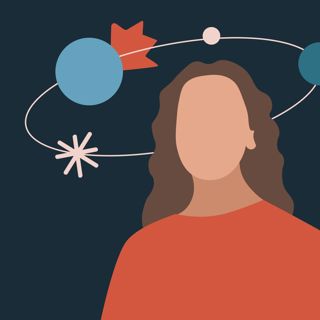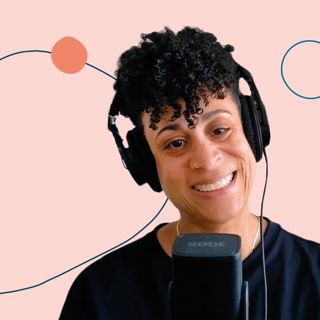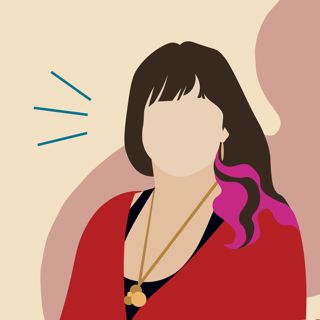
What’s so funny about ADHD? (Comedian Jim Tews’ story)
Jim Tews is a comedian, Coast Guard veteran, and New York Times bestselling author who’s not shy to talk about ADHD in his stand-up act. Jim shares how he went from doing admin work in the Ohio Coast Guard to community college, where panic attacks finally led to his ADHD diagnosis. Jim shares what it was like trying medication for the first time and why he thinks he wasn’t diagnosed sooner. (“I had girl ADHD.”) These days, he’s channeling all of it into comedy. With a new special (With Pictures) and album (Without Pictures), Jim talks about how stand-up keeps him grounded and what he’s learned along the way. He also looks back on a childhood full of distractions — like hiding behind doors and watching squirrels — and how those moments still show up in his life and work.For more on this topic: Jim’s book: Felines of New YorkADHD and distraction in the militaryADHD and the brainTimestamps: (01:52) Starting out in the Coast Guard in Ohio(05:51) Jim’s doctors dismiss a possible ADHD diagnosis(07:30) How college made ADHD more obvious(15:29) Going alcohol-free with ADHD(16:45) ADHD stories from childhoodFor a transcript and more resources, visit ADHD Aha! on Understood.org. You can also email us at adhdaha@understood.org. Understood.org is a nonprofit organization dedicated to empowering people with learning and thinking differences, like ADHD and dyslexia. If you want to help us continue this work, donate at understood.org/give Hosted by Simplecast, an AdsWizz company. See pcm.adswizz.com for information about our collection and use of personal data for advertising.
28 Okt 23min

A valedictorian with ADHD, autism, and a disciplinary record (Ann Bennett’s story)
This week, host Laura Key sits down with her co-worker Dr. Ann Bennett, who leads applied research and evaluation at Understood.org. Ann shares her own autism and ADHD diagnosis story — one that didn’t unfold until the end of her PhD program.Ann was valedictorian of her high school. She also had a disciplinary record. She’d get bored and sometimes fall asleep in class because she’d already taught herself the material. First diagnosed with autism and later with ADHD, Ann reflects on what those labels helped her understand about herself and her brain.She also shares findings from our recent “Women With ADHD: The Power of Podcasts” study, where she surveyed and interviewed women who listen to Understood podcasts — including ADHD Aha! Along the way, Ann found herself having her own “aha” moments.For more on this topic: Women with ADHD: The power of podcastsWhat is AuDHD?ADHD and womenTimestamps: (00:00) Intro(02:08) Growing up undiagnosed (06:13) Being diagnosed with autism and ADHD during her PhD(11:07) Meeting her husband, and unmasking for the first time(13:28) Sharing her story more with others(14:19) “Women With ADHD: The Power of Podcasts” study Ann conducted on Understood.org podcasts(23:44) Specific statistics from the study(32:00) Outro and creditsFor a transcript and more resources, visit ADHD Aha! on Understood.org. You can also email us at adhdaha@understood.org. Understood.org is a nonprofit organization dedicated to empowering people with learning and thinking differences, like ADHD and dyslexia. If you want to help us continue this work, donate at understood.org/give Hosted by Simplecast, an AdsWizz company. See pcm.adswizz.com for information about our collection and use of personal data for advertising.
21 Okt 33min

When one twin has ADHD and gets labeled “the bad one” (Lisa McNeil’s story)
Lisa McNeil grew up being called the “bad” twin — the one who talked back and couldn’t do well in school. Her sister was the “good” one. It wasn’t until years later, when Lisa joined a Duke University study to earn some extra cash, that she discovered she had ADHD.In this episode of ADHD Aha!, host Laura Key talks with Lisa about how that ADHD diagnosis reframed her childhood, why being a paramedic suited her brain, and how playing violin in fourth grade unexpectedly helped her with reading.For more on this topic:ADHD and siblings: Tips from an expertHow to deal with sibling rivalry when one child learns and thinks differentlyTimestamps:(00:00) Intro(02:19) Growing up as a twin(09:22) The impact of music on Lisa in the fourth grade(11:23) Early adulthood before ADHD diagnosis(12:33) The Duke study Lisa took part in to be diagnosed(16:02) How religion has affected Lisa’s relationship with her family as an adult (18:10) Life after diagnosis(23:27) Outro and creditsFor a transcript and more resources, visit ADHD Aha! on Understood.org. You can also email us adhdaha@understood.org. Understood.org is a nonprofit organization dedicated to empowering people with learning and thinking differences, like ADHD and dyslexia. If you want to help us continue this work, donate at understood.org/give Hosted by Simplecast, an AdsWizz company. See pcm.adswizz.com for information about our collection and use of personal data for advertising.
14 Okt 24min

She treated ADHD for years — then found out she had it, too (Dr. Nerissa Bauer’s story)
Have you ever felt like a fraud, even in the work you know best? Dr. Nerissa Bauer has. After years as a researcher, teacher, and children’s doctor, burnout led her to step away from academia. Not long after, she found out she had ADHD herself. At first, the diagnosis left her embarrassed and full of questions. How could she have missed it for so long?That turning point brought both sadness and relief, and it changed the way she connects with families. Since then, Nerissa has built a new path in telehealth and started Teach Me ADHD, an online course for families. In this episode, she talks about how burnout and her own ADHD diagnosis reshaped her work — and how they help her show up more honestly for others.For more on this topicNerissa’s organization, Let’s Talk Kids HealthADHD burnoutADHD and: Imposter syndromeTimestamps(00:00) Intro(01:23) ADHD and burnout, and losing structure(08:23) Nerissa’s ADHD evaluation as a physician herself, and imposter syndrome(16:42) What is the value of an ADHD diagnosis as an adult? As a parent?(21:08) Nerissa’s online course, Teach Me ADHD(26:28) Outro and closingFor a transcript and more resources, visit the ADHD Aha! show page on Understood.org. We love hearing from our listeners! Email us at adhdaha@understood.org or record a message for us here. Understood.org is a nonprofit organization dedicated to empowering people with learning and thinking differences, like ADHD and dyslexia. If you want to help us continue this work, donate at understood.org/give Hosted by Simplecast, an AdsWizz company. See pcm.adswizz.com for information about our collection and use of personal data for advertising.
30 Sep 28min

Math anxiety, caffeine, and learning to manage emotions with ADHD (Derek Miller’s story)
Derek Miller wears many hats: money coach, musician, athlete, performer, cider guide, and more. His ADHD story is just as full of twists. Derek didn’t find out he had ADHD until college. The jump from high school left him struggling to focus — especially while also caring for his wife during her cancer treatment. To get through the stress, he often used caffeine, while also working on managing his emotions and finding ways to improve himself.Derek’s view of life and money also changed during his time in Mozambique, where he served as a Mormon missionary. That experience shaped how he thinks about community and resilience. In this episode of “ADHD Aha!,” host Laura Key talks with Derek about majoring in math even though he had math anxiety, how he learned to handle his emotions and focus, and why he now helps others build a healthier relationship with money.For more on this topicADHD and managing moneyADHD and caffeineDerek's financial education instagramTimestamps(00:00) Intro(01:07) Derek’s college ADHD diagnosis story(05:53) Math anxiety(09:04) Self awareness and introspection(12:32) How emotional money can be(15:49) Derek’s time living in Mozambique, and what he learned about rejection sensitivity(21:40) What’s next for Derek(22:53) Outro and creditsFor a transcript and more resources, visit the ADHD Aha! show page on Understood.org. We love hearing from our listeners! Email us at adhdaha@understood.org or record a message for us here. Understood.org is a nonprofit organization dedicated to empowering people with learning and thinking differences, like ADHD and dyslexia. If you want to help us continue this work, donate at understood.org/give Hosted by Simplecast, an AdsWizz company. See pcm.adswizz.com for information about our collection and use of personal data for advertising.
16 Sep 24min

She broke the silence on ADHD shame in women (Sari Solden’s story)
Sari Solden is a psychotherapist, author, and a true trailblazer for women with ADHD. In this episode, she talks about discovering her own ADHD while helping shape the growing field of adult ADHD in the 1990s. She shares openly about her struggles with shame, working memory, and the pressure of trying to meet society’s expectations of what a woman “should” be. She also reflects on lessons learned from the many women she has worked with over the years.Sari takes us behind the scenes of her early meetings with other ADHD experts at a time when adult ADHD was just starting to be recognized. She’s the author of several books, including “Women with Attention Deficit Disorder,” which celebrates its 30th anniversary this year. Through her pioneering work, Sari gave voice to countless women whose struggles were long misunderstood or overlooked.Related resourcesHear Sari on “Climbing the Walls,” our podcast about the rise of ADHD diagnoses in womenA deeper dive on ADHD and shameWhat is working memory?For a transcript and more resources, visit the ADHD Aha! show page on Understood.org. We love hearing from our listeners! Email us at adhdaha@understood.org or record a message for us here. Understood.org is a nonprofit organization dedicated to empowering people with learning and thinking differences, like ADHD and dyslexia. If you want to help us continue this work, donate at understood.org/give Hosted by Simplecast, an AdsWizz company. See pcm.adswizz.com for information about our collection and use of personal data for advertising.
2 Sep 26min

An unexpected ADHD diagnosis following her daughter’s traumatic birth (Erica Shoemate’s story)
When Erica Shoemate gave birth to her daughter Nia, she was told Nia wouldn’t survive. But today, Nia is 7 years old — and that traumatic birth became a turning point in Erica’s life. Erica shares how her postpartum experience led to diagnoses of anxiety and PTSD, and eventually ADHD. A former national security analyst turned maternal health strategist and policy advocate, Erica reflects on the layered stigma of mental health in the Black community. She also talks with Laura about ADHD and hormones. And she shares the comment her husband made that sparked her ADHD evaluation.Related resourcesErica’s website, www.ericalshoemate.comA guide to ADHD and hormonesFrom the Hyperfocus podcast: Did my ADHD make me more likely to have postpartum depression? ADHD and pregnancyTimestamps(00:00) Intro (02:09) How Erica’s pregnancy journey led to her ADHD diagnosis (10:07) What Erica’s diagnosis has taught her about herself(16:10) Why Erica speaks openly about her ADHD diagnosis (21:26) Erica’s maternal health advocacy workFor a transcript and more resources, visit the “ADHD Aha!” show page on Understood.org. We love hearing from our listeners! Email us at adhdaha@understood.org or record a message for us here. Understood.org is a nonprofit organization dedicated to empowering people with learning and thinking differences, like ADHD and dyslexia. If you want to help us continue this work, donate at understood.org/give Hosted by Simplecast, an AdsWizz company. See pcm.adswizz.com for information about our collection and use of personal data for advertising.
19 Aug 23min

How do you make invisible struggles visible? (Kate Hammer’s story)
It’s one thing to wonder if you have ADHD. It’s another to read how your loved ones see it in you. Host Laura Key talks with writer, director, and performer Kate Hammer, who was born in Canada and now lives in Scotland. Kate shares her experience navigating the U.K.’s ADHD evaluation process, which includes personal letters from family and friends, and the complex emotions it brought up. She also discusses her short film, Bear, a surreal, funny, and poignant look at how ADHD can shadow your every move. In the film, a woman on her way to a job interview is followed by a bumbling bear — clumsy, loud, and impossible to ignore. The Bear represents ADHD in all its disruptive, intrusive glory. Kate talks about why she chose to visualize ADHD this way, how humor helps her process, and what it means to turn something invisible into something you can’t ignore.Related resourcesKate’s short film Bear trailerKate’s full short film Bear (Password: BossJude)Timestamps(00:00) Intro(01:03) The UK ADHD evaluation process(07:26) What ADHD traits cause Kate shame and guilt? (08:44) Kate’s short film Bear(16:58) Validating the challenges of ADHD through her short film(21:27) Kate’s ADHD aha! moment(s)(23:05) Outro and creditsWe love hearing from our listeners! Email us at adhdaha@understood.org or record a message for us here. Understood.org is a nonprofit organization dedicated to empowering people with learning and thinking differences, like ADHD and dyslexia. If you want to help us continue this work, donate at understood.org/give Hosted by Simplecast, an AdsWizz company. See pcm.adswizz.com for information about our collection and use of personal data for advertising.
5 Aug 24min






















